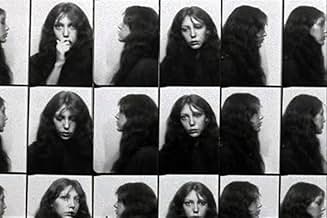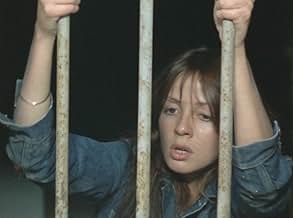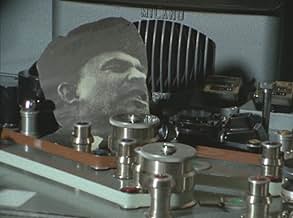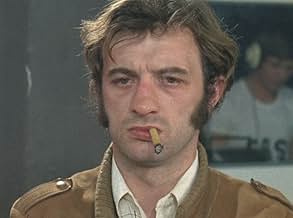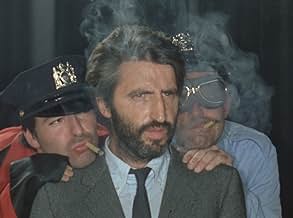Füge eine Handlung in deiner Sprache hinzuIn Godard and Gorin's free interpretation of the Chicago Eight trial, Judge Hoffman becomes Judge Himmler (who doodles notes on Playboy centerfolds), the Chicago Eight become microcosms of F... Alles lesenIn Godard and Gorin's free interpretation of the Chicago Eight trial, Judge Hoffman becomes Judge Himmler (who doodles notes on Playboy centerfolds), the Chicago Eight become microcosms of French revolutionary society, and Godard and Gorin play Lenin and Karl Rosa, respectively, ... Alles lesenIn Godard and Gorin's free interpretation of the Chicago Eight trial, Judge Hoffman becomes Judge Himmler (who doodles notes on Playboy centerfolds), the Chicago Eight become microcosms of French revolutionary society, and Godard and Gorin play Lenin and Karl Rosa, respectively, discussing politics and how to show them through the cinema.
- Regie
- Drehbuch
- Hauptbesetzung
- Yves Alfonso
- (Nicht genannt)
- Juliet Berto
- (Nicht genannt)
- Bobby X
- (Nicht genannt)
- Friedrich Vladimir
- (Nicht genannt)
- …
- Karl Rosa
- (Nicht genannt)
- …
- Judge Julius Himmler
- (Nicht genannt)
- Dave Dellinger
- (Nicht genannt)
- Anne Wiazemsky
- (Nicht genannt)
Empfohlene Bewertungen
BACKGROUND: Vladimir and Rosa (1970) was one of many works produced by The Dziga Vertov Group between 1969 and 1971, continuing the collaboration between filmmakers Jean Luc Godard and Jean-Pierre Gorin from the earlier works, A Film Like Any Other (1968) and British Sounds (1979), and leading into the similarly progressive likes of Pravda (1970), Wind from the East (1970) and Struggles in Italy (1971). Afterwards, the duo would use their own names on the more widely seen satire Tout va bien (1972), before bringing the experiments to a close with the final Dziga Vertov film, Ici et ailleurs (1976). PRESENTATION (2): The first step in this was Godard's Le Gai Savoir (1969), which took the influence of Brecht in a direction later copied by Derek Jarman and Lars von Trier; with Godard faming the self-reflexive political discussions of Jean-Pierre Léaud and Juliet Berto against the plain black background of an empty television studio. Although the presentation was more radical than even Week End (1967), or preceding works like 2 or 3 Things I Know about Her (1967) and La Chinoise (1967), it was still very much a Godard film at heart; with the deliberate compositions and occasionally jarring appearance of those rich primary colours once again showing the director to be much more potent as an artist than as a political free-thinker.
DZIGA VERTOV: Like much of Godard's work from the mid 1960's on, Vladimir and Rosa is defiantly political. However, where the Dziga Vertov films differ from his own work, pre-Week End, is in the presentation of the content; with Godard ceasing to make political films and turning instead to film-making that was political! The difference here was in Godard's rejection of artistry; choosing to share all responsibilities with Gorin and forsaking on screen credits in favour of recognisable voice-over narration, whilst simultaneously striving to make the experience as jarring and (visually) ugly as humanly possible. Taking into consideration the quality of the tape that I saw, I will have to assume that Godard and Gorin didn't really intend for the images to be quite so dark and tinted. However, even if that were not the case, the majority of the images, particularly in the first half of the film, are fragmented completely beyond recognition; with that cut-up combination of images that seem part cinema and part documentary eventually leading to later projects, in which still photographs and archival footage were also used to argue a point.
THEME: The film could be thought of as both a political satire and a court-room thriller; with the Godard and Gorin using the background of the Chicago Eight trial and the sidelines into the plight of Bobby Seale and his connection to the Black Panther Party (eventually leading to the Chicago Seven) to create a work of highly provocative agitprop. The film dramatises certain elements leading up the arrest, including the background of the 1968 Democratic National Convention and the implication of police violence and intimidation leading to riots and angry protests. From here, the trial is documented in a way that is somewhat reminiscent of the visual approach of Le Gai Savoir, right down to the use of minimal production design with the barren black background of theatrical artificiality and the way that the characters speak directly to the camera in a completely deconstructive approach. PRESENTATION (3): There are also Godard's continual experiments with the juxtaposition of sound and images and the jarring use of editing and sound design; as well as some inventive visual compositions that draw our attention to the artificiality of the production and how the inherent falseness of it all relates to the issues expressed within the film.
POLITICS: The political subtext of the film is incredibly weighty here, with neither Godard nor Gorin pulling their punches in regards to the bombardment of information, both spoken and textual, that appears on screen. Naturally, its context is incredibly dated now, with the political climate and the background of the film having been confined to a brief moment of twentieth-century history that is no doubt of incredibly limited interest to the majority of contemporary viewers experiencing this work. As a result, Vladimir and Rosa will be a difficult, if not entirely hopeless film, for the vast majority of viewers at odds with Godard's style or the progressive attitudes of the Dziga Vertov Group. For me, as someone with a genuine admiration for Godard's style and approach, I would rate this as one of his most visually arresting works, definitely in need of a DVD restoration so that we can better appreciate the film on a purely cinematic level. It might not be an entertaining film in the traditional sense, but without question, this is a completely interesting work, that benefits from Godard's intelligent direction.
Firstly, perhaps I am luckier than when it was reviewed some years ago that I was able to see a rather good print streamed from Amazon - though it has to be said that Godard is not generally a slave to print quality preferring, as I think he once said, to make a film to have a discussion with the audience than to entertain.
Like much of Godard, it is not an 'easy' watch as the viewer is bombarded with so many ideas in such rapid succession. One might even wish to use a pause button to go over a few lines and examine the philosophical implications.
Vladimir et Rosa is usually grouped, quite understandably, with the 'political' period of Godard's work, yet it can also be viewed purely as cinematic, just as von Trier's Dogville is a work of art over and above any political interpretations. Godard (again from memory) has even disparaged such a label: the inference being that the material is simply used as a canvas with which to make a film and ask interesting questions. U.S. student protests against the U.S. Vietnam for instance, which form a backdrop to Vladimir et Rosa, are today very old news, and the "oppression of the majority by a minority" can be taken as any minority against a majority, not just within Western capitalism.
Even on a less philosophical level, Vladimir et Rosa has, I think, more accurately been described as a film about the theory of making political films politically.
This is further underlined by examining firstly oppression of black people and then, very acutely, oppression of women. In a most memorable scene, a woman is explaining to a man, presumably her loving partner, that even if he has read the feminist tract she has written, even if he 'understands' it, and even when he reads it out loud, he is not understanding it in the way that she has written or reads it. Sitting behind him, she gently but firmly takes his head in both her hands and instructs him to read it as he were her.
The film is even more relevant today (2020) in the wake of MeToo campaigns, and BlackLivesMatter campaigns -- with many men wanting to support women's rights and many white men and woman wanting to support black men and women's rights. It suggests an almost impossible leap to understand an issue from the opposite viewpoint, and the temerity, even with the best intentions, of claiming to do so in a knee-jerk fashion, especially (but not only) if one is part of the dominant colour/gender. (One could likewise compare it to the LGBT debates).
Is this enduring quality not, rather than the temporal association with the political situation and time depicted in the film, a sign of artistic greatness?
Having said that, anyone *not* familiar with the Chicago 7 (or Chicago 8 depending how they are counted) is well-advised to google it before watching. The film assumes the viewer is conversant with it, and with the political turmoil, protests and sometimes brutal suppression that occurred during that era of American history. History is it, and not a reflection of America generally, even if it is epitomized in the film in order to examine certain themes.
Finally, for enthusiasts who enjoy Godard's constant invention of technique, Vladimir et Rosa doesn't disappoint. From the now familiar Brechtian self-analysis and self-commentary, who else could turn a black screen into a symbolic work of art and justify with the dialogue as it is thrust down the viewer's throat? (In balance, the film also has one or two laugh-out-loud moments.) The words 'theorie' and 'pratique' are emblazoned across the screen and the dialectic continued as Godard and Gorin run back and forth across a tennis court discussing film-making while the bourgeois carry on their game, oblivious.
At one point, quite early on, we are confronted by graffiti written over a Marx Bros. poster saying, "Sometimes the first meaning of a film is not apparent until the second viewing."
Well said.
Wusstest du schon
- VerbindungenEdited into Une Jeunesse allemande - Eine deutsche Jugend (2015)
Top-Auswahl
Details
Zu dieser Seite beitragen


